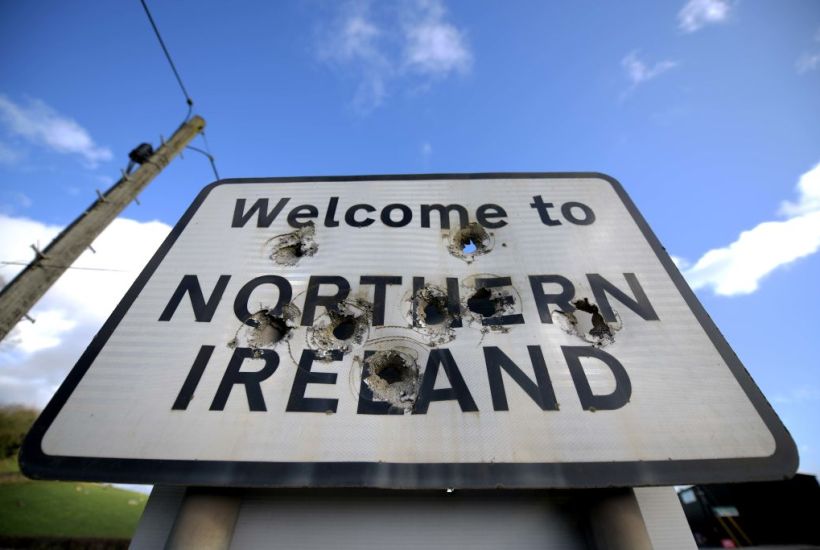At times, it can be hard to avoid the preachy style of reviewing that talks to readers in the tone of a teacher ordering you to eat your greens. This, I’m afraid, is one of them. If you know what’s good for you, watch Spotlight on the Troubles: A Secret History on BBC iPlayer and wonder, not only at the quality of the journalism, but about what Brexit will do to Ireland and Britain.
It is an education and not just for the ignorant. For me and those like me who thought they knew a little Irish history, it shows we knew next to nothing.
The 30-year war and the cynicism and viciousness of its main players is played out. A counter at the bottom of the screen ticks up over 3,000 as it records the rising death toll. The series is as good as Ken Burns and Lynn Novick’s great televised history of the Vietnam War. It is better in one respect as Darragh MacIntyre and his colleagues use the techniques of investigative journalism to reveal as well as chronicle.
The Spotlight team are not receiving the recognition they deserve – the series is on BBC4 not a mainstream channel – for a reason that lands us back in 2019. Most British people don’t want to know about Northern Ireland. And I don’t just mean voters who are too young to remember the conflict. The rulers of the country, who ought to know about Ireland – and if they don’t are surrounded by civil servants who do in fact know – have treated Northern Ireland as if it were Neville Chamberlain’s ‘far away’ country filled with ‘people of whom we know nothing’.
The darkest comic turn Brexit has performed is to force the rest of Britain to think about Northern Ireland. The joke is on both sides.
Vote Leave pretended in the 2016 referendum campaign that to claim there could be difficulties in Ireland was ‘scaremongering’, in the words of Theresa Villiers (who has survived the shame). Boris Johnson bettered her and said the Irish border between north and south was no different to the border between Camden and Islington. (Ditto.)
Brexit-supporting Tories had cover. In apparent seriousness, the Democratic Unionist party maintained that Brexit would strengthen the Union. The faith they put in English Tories was anomalous. Ulster unionism is the most neurotic British identity, based as it is on the belief that Britain will betray Northern Ireland’s Protestants unless they force it into line. With physical force, if necessary.
The Spotlight history opens in the late 1960s with evidence that Ian Paisley’s associates, rather than the IRA, organised the first bomb attacks of what we so genteelly call ‘the troubles’ – as if a filthy little war was comparable to a temporary financial difficulty. And follows it with the dry recollection of Colonel David Hancock of his first tour in Ireland. The British army had been fired on all over the world, he said, but it had to wait until it came to Belfast to be attacked by gunmen waving the union jack.
When he finally had to, if not confront reality, then at least acknowledge reality’s existence, Johnson tried to solve the problem of a land border within the island of Ireland, which would have infuriated nationalists and the EU, by promising a trade border between northern Ireland and the rest of the UK instead, which has infuriated unionists.
Their outrage was that of a betrayed teenage lover. Contrary to their traditions, they had actually believed not only the British government but Boris Johnson. Even for a Protestant fundamentalist party with a loud creationist wing this was credulity of Biblical proportions.
Still remainers of my age worry about violence returning and not just because Johnson’s latest plan seems as half-cocked as its predecessors were. The best reason to think that the fools of the Brexit movement have never wanted to understand the risks they are running is found in Glenn Patterson’s new book Backstop Land. I assure you I am not saying you should read it because it will be as good for you. Witty and wise, reading Patterson is like walking into a Belfast pub for lunch and falling into a conversation so good you stay until chucking out time.
Patterson tackles a moral problem remainers have ducked. We are very good at condemning Conservatives for raising the prospect of riots on the streets if a second referendum is held. Aren’t Tories the people who are meant to be ‘tough on crime’ and are they not the first to say ‘you should never give in to terrorism’? Yet remainers are happy to use the prospect of a return to ‘the troubles’ as an argument against Brexit.
It won’t wash: or not quite. Sectarian hatred and terrorist forces have never gone away, the ‘peace process’ notwithstanding. Dissident republicans, who with justice don’t regard themselves as dissident, but as the true inheritors of the violent republican tradition, would still be killing whether Britain leaves the EU or not. Rather than using paramilitaries as conscripts in the Brexit war, ‘the response of democrats,’ says Patterson, ‘has surely got to be that…we will never, ever encourage the belief that violence might actually yet be effective in bringing about political change’.
Similarly the Ulster Volunteer Force, whose willingness to massacre civilians exceeded even that of the IRA, is still there and does not need the excuse of the Brexit debacle to attack Catholics and terrorise neighbourhoods.
Both Republicans and Unionists organise punishment beatings and kneecappings – that is they engage in extra-judicial torture. Both live in segregated neighbourhoods. Both send their children to segregated schools in Ireland’s Christian version of Apartheid and both would have done so whether David Cameron had decided to tear the country apart or not.
Yet there’s no escaping that Northern Ireland was at war for 30 years. Ethno-religious terrorist groups are ready to exploit tensions. Violence and the threat of violence does influence politics so much so that the DUP’s leader, Arlene Foster, reportedly ran her party’s reaction to Johnson’s deal by groups including known figures from the UDA and UVF.
The real charge against proponents of Brexit is that they barged their way into Ireland without the smallest idea of what they were doing or what the consequences would be. Describing the Tory leadership contenders’ answers to questions on Ireland, Patterson says, it was like a quiz show where ‘the one who tells the stupidest, most obvious lie proceeds to the next round’. I should not need to stress that Irish affairs are not the only victim of wilful ignorance as anyone running a private company or public institution will know.
It has become traditional at this point for remainers to lament that conservatives once knew when to leave well enough alone and quote a few lines of Edmund Burke to justify their nostalgia. I fear I have done so myself when I should have known better. Brexit shows that the notion that conservatives are wary of harebrained ideologies flatters more than it illuminates. Rather than quote Burke, Patterson uses a far more apposite line from EL Doctorow as his guide:
‘The philosophical conservative is someone willing to pay the price of other people suffering for his principles.’
It’s worth watching Spotlight on the Troubles as Northern Ireland and the rest of the country carry the wounds conservatives have so bravely inflicted on everyone but themselves and hope it’s not a prequel.
Got something to add? Join the discussion and comment below.
Get 10 issues for just $10
Subscribe to The Spectator Australia today for the next 10 magazine issues, plus full online access, for just $10.





















Comments
Don't miss out
Join the conversation with other Spectator Australia readers. Subscribe to leave a comment.
SUBSCRIBEAlready a subscriber? Log in